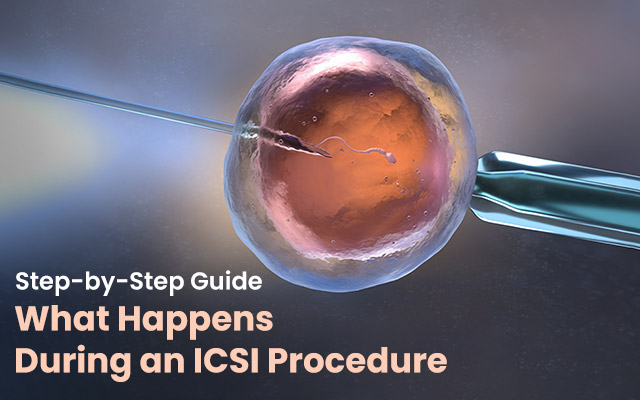November 14, 2025 | by Admin

Struggling with infertility can feel overwhelming. At a trusted ICSI clinic, couples find renewed hope through advanced fertility solutions.
In this guide, we will explore every stage of the ICSI procedure steps—from preparation to recovery. You will also learn about the ICSI success rate, potential risks, and how it differs from IVF.
Doctors recommend ICSI when sperm quality or count is low. It also helps in cases of previous IVF failures or unexplained infertility. Couples with sperm-related issues often benefit most from ICSI.
The fertility specialist evaluates both partners through blood tests and semen analysis. This helps create a personalised treatment plan before starting ovarian stimulation.
Hormonal medications stimulate multiple egg growth in the ovaries.
Doctors prescribe injectable hormones for 10–12 days. These medications help follicles grow properly.
Frequent ultrasounds track follicle size and egg maturity.
When follicles reach ideal size, an hCG injection triggers ovulation.
ICSI egg retrieval happens 34–36 hours after the trigger shot. The procedure takes place under light sedation. Doctors use a thin needle guided by ultrasound to collect mature eggs.
Men provide a semen sample the same day as egg retrieval. If the sperm count is low, doctors may extract it directly from the testicles.
Embryologists examine sperm under a microscope to identify the healthiest ones.
This is the heart of the ICSI procedure steps. A single sperm is directly injected into a mature egg using a fine needle—this is the ICSI sperm injection. This process increases fertilisation chances compared to traditional IVF.
After injection, fertilised eggs are monitored for normal division and growth.
Embryos grow in a lab for three to five days.
Embryologists grade embryos and choose the healthiest ones for transfer.
Doctors ensure the uterus lining is thick and receptive.
A thin catheter places embryos inside the uterus. The process is painless and quick.
Patients rest briefly and continue hormonal support. Avoid stress and follow dietary advice.
Emotional balance matters. Support from family and counsellors helps reduce anxiety.
Recovery takes only a few days. Most patients return to their daily routines soon.
Possible ICSI complications include ovarian hyperstimulation, infection, or multiple pregnancies. Choosing an experienced ICSI clinic in Kolkata helps reduce these risks.
The ICSI success rate depends on age, egg quality, and lab conditions. Success rates often range between 50% and 70% per cycle at reputed clinics.
The ICSI treatment cost varies with clinic experience and additional procedures. Most couples find the investment worthwhile given its high success potential.
If ICSI isn’t suitable, couples can explore IVF or donor programs. Understanding ICSI vs IVF helps choose the right approach based on fertility goals.
The ICSI procedure timeline might seem complex, but it offers remarkable outcomes for many couples. It combines precision, technology, and care to fulfil your dream of parenthood.
If you are ready to begin your fertility journey, visit Petals Family Clinic, a trusted ICSI clinic in Kolkata. Get expert guidance, transparent pricing, and compassionate care that leads to real results.
1. What is the ICSI procedure timeline?
It usually takes three to four weeks, including stimulation and transfer.
2. How does ICSI differ from IVF?
In ICSI, one sperm is injected directly into the egg. IVF allows sperm to fertilise naturally.
3. What affects the ICSI success rate?
Egg quality, sperm health, and laboratory expertise determine success.
4. How much does ICSI treatment cost in Kolkata?
It depends on medication, lab charges, and the doctor’s expertise.
5. What is the ICSI recovery time?
Most women recover within two to three days after the procedure.